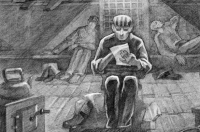People love to tell stories. That’s how it’s always been – storytelling predates writing. Nowadays, digital technologies allow stories to be heard by anyone who is willing to listen. StoryCorps is one of the platforms for just that.
What is StoryCorps?
Simply put, it’s a project that encourages people to share their stories. Interview sessions with participants are being recorded, processed, and uploaded to the StoryCorps’ website, where they become available for everyone. The concept of this project revolves around grassroots history: the participants get to tell their stories without any additions or interpretations by others. Interviewers make sure that participants feel comfortable. Such an attitude allows the storyteller to express themselves freely and gives us an opportunity to hear honest stories that otherwise could be forgotten or neglected.
Here is the key section of the website where you can browse the stories. They are divided into animations (short videos which illustrate the stories) and podcasts (the interviews themselves). The topics are very diverse. For example, you can check out a touching video illustration of a story about growing up with blind and deaf parents, or listen to the memories of people who witnessed the nuclear bomb explosion.
How can these stories be of use to us?
Practice your English
StoryCorps is a great platform for listening to native English speakers talk. They aren’t professional broadcasters or actors, so you get a chance to listen to real everyday speech. Plus, while browsing the recordings, you can choose a specific region and hear how people speak there. If you find some words too hard to understand, you can always take a look at the transcript of a podcast.
Analyze data
The massive amount of recordings can also be used as a source of data or inspiration for research in such fields like (oral) history, folklore studies, digital humanities, and so on. This unique source provides us with stories that would be hard to access elsewise. Digital technologies and open access to recordings give us a wide range of possibilities for research. StoryCorps may also be useful for future historians, who will be able to study modern historical events as they were described by contemporaries. You can learn more about access to the StoryCorps archive for research here.
Learn how to listen
As we can see, StoryCorps can be useful for your studies. However, its advantages go beyond that. Hundreds of fascinating stories available on StoryCorps may help us understand each other better. According to the researcher Benjamin Filene, this project is not only about talking, telling stories and sharing personal experiences. It’s all about listening. The author argues that a lot of tensions and problems in the current American society that occur today stem from the fact the media encourages polarized opinions which create conflict.
The founder of StoryCorps, Dave Isay, seems to agree. The title of his book, Listening Is an Act of Love: A Celebration of American Life from the StoryCorps Project, speaks for itself. Dave Isay believes that the distracting and numbing force of conventional media diverts people from what is really important – listening to fellow citizens and understanding them while enjoying their stories.
Considering how many events take place around the world right now and how many conflicts, arguments, and disagreements there are, the ability to pay attention to the opinions of others truly does seem crucial. This project acknowledges and embraces the diversity of the human race, thus letting us see various perspectives from people who are so unlike each other. Or are they really?
If you’re interested in similar projects, you can find a list of several more useful links that allow you to explore Russian history and language here. One of the projects was developed by ITMO University’s DH Center, which is also open for collaboration.
Thanks to Elizaveta Diachenko for inspiration




